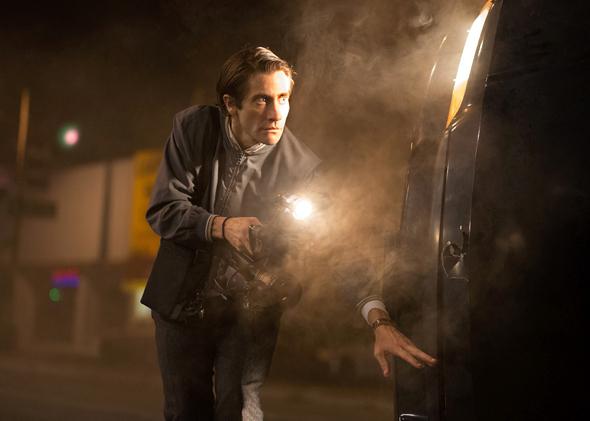Louis Bloom, the L.A. thief-turned-news-videographer played by a gaunt Jake Gyllenhaal in writer-director Dan Gilroy’s debut feature Nightcrawler, is one of those characters who’s somehow the wrong size for the movie that surrounds him. Or maybe it’s just that Lou is so uncomfortable in his own skin he wouldn’t seem at home in any movie. At once unctuous and maladroit, Lou communicates almost exclusively in noxious business-speak platitudes (backed up, when necessary, by explicit threats of extortion or violence). As he works his way from fencing illegally salvaged scrap metal to peddling ethically dubious footage of the latest local murder or highway collision, Lou never stops seeing himself—and selling himself—as anything but a enterprising businessman struggling to make it in a tough market. He’s the self-made man as self-made monster.
But for all his delusional self-esteem and steadily accruing menace (conveyed precisely, if a little showily, by Gyllenhaal’s detail-crammed performance), Lou Bloom is no Travis Bickle, the disturbed Vietnam vet whose descent into madness and violence unfolded before our eyes in Martin Scorsese’s Taxi Driver. If anything, Lou’s cheerfully soulless can-do spirit is more suggestive of Sammy Glick, the go-getter protagonist of What Makes Sammy Run? Lou seems intended less as a psychological case study than an allegorical type, a symbol of something vague and slippery offered up for our condemnation: The voracity of the TV news media? American capitalism at its most amoral? The trouble with youth today?
One recurring feeling, watching Nightcrawler, is that it seems like a lot of satirical hue and cry about a social problem I’m not sure the nation is currently plagued by. Are local TV news stations really conducting daily bidding wars over the goriest footage random freelancers can bring them at the last moment? Even allowing that some version of this transaction has happened in the history of TV journalism, would it be the likely path a creepy amateur videographer would choose in the age of the Internet? Couldn’t he eliminate the middleman and start his own creepy amateur website?
Really, though, questions of logic and verisimilitude seem out of place with respect to Nightcrawler, which aspires neither to be a naturalistic character portrait nor a Network-style media satire. Really, it’s just a nasty little neo-noir about the meteoric rise of an unscrupulous scumbag. As he climbs the ranks of L.A.’s freelance violent-video purveyors, Lou gets professionally and personally embroiled with a news producer at one of the local stations, played with a great weary verve by Rene Russo. Lou mistakes her boundless appetite for his most violent videos—the ones other producers hesitate to air—for a different kind of desire, and strongarms her into coming out on a grotesquely inappropriate date involving margaritas, sexual harassment, and a little light blackmail.
Negotiation, with all the moral compromise it can imply, becomes a central theme in Nightcrawler. “I’m not negotiating with you!” characters snap at Lou over and over again, only to find that, just by talking to him, they are de facto engaged in some queasy transaction; there’s no relationship in Lou Bloom’s narrow, mercenary world that isn’t transactional. Bill Paxton enthusiastically tucks into a small role as Lou’s sneering chief competitor in the business of sordid video gathering. The Paxton character’s blustering attempt to headhunt this stubbornly self-sufficient newcomer makes for one of the movie’s funniest scenes.
The central relationship in Nightcrawler, and the only one with real emotional weight, is the one between Lou and his sole business associate, Rick (the hopefully-soon-to-be-famous Riz Ahmed). Young Rick is homeless when Lou brings him on as an intern for a paltry $30 a night. At first he’s asked only to navigate from the passenger seat as Lou careens at terrifying speeds toward whatever accident or crime scene pops up on the police scanner. But the tasks Lou assigns Rick quickly become more and more unsavory, not to mention questionably legal. A scene in which the unassertive but deeply conflicted Rick finally works up the courage to confront his exploitative boss is both comic and heartbreaking. Ahmed, a dashing British actor and DJ of Pakistani descent, most recently made an impression in the lead of Mira Nair’s otherwise unremarkable The Reluctant Fundamentalist; before that, he played one of the bumbling would-be terrorists in the dark political comedy Four Lions. A performer of evident intelligence playing a character who’s something of a naive dim bulb, Ahmed provides the closest thing this luridly skeezy movie has to a moral center.
Dan Gilroy, in addition to being Russo’s real-life husband, is the younger brother of Tony Gilroy, who made a similarly audacious debut several years ago with Michael Clayton. (Tony is credited as a producer on this film, which Dan’s twin brother John also edited.) Though Dan (who collaborated with Tony on the Bourne Legacy screenplay) establishes an enjoyably seedy nocturnal L.A. vibe (aided in no small part by There Will Be Blood cinematographer Robert Elswit) and showcases a trio of big, pulpy performances—Gyllenhaal’s, Russo’s, and Ahmed’s—ultimately Nightcrawler sets its sights too low. Rather than finding a way to help us understand, if not sympathize with, the repulsive Lou, Gilroy settles for building an elaborate fishbowl of a movie around this relentlessly antipathetic character, allowing the audience to peer in on him curiously from a reassuring distance. Nightcrawler, like its entrepreneurial-to-a-fault protagonist, is ambitious but ultimately hollow, eager to dazzle and shock us but reluctant to let us inside.
